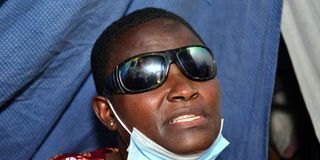I may be blind but I’m the light that helps others see

Angela Nzilani, a visually impaired community health volunteer speaks on her experiences working as a blind volunteer during an interview with the Nation at her home in Kibera on October 2, 2020.
What you need to know:
- As a volunteer healthcare worker, Angela helps reduce health disparities in her underserved community by providing culturally appropriate health education, advocating for underserved individuals to receive proper health services, and providing informal counselling, health screenings, and referrals.
- Angela continues to spread hope and information in her community to enable them to keep safe and sane in a pandemic whose end is unknown.
Angela Nzilani’s first instinct when she heard about the first case of Covid-19 in Kenya in March 2020 was to lock herself up in the house and never come out until the virus was wiped out.
“I feared for my life and that of my children.”
As a blind person, she relied on her sense of touch to get by and could not imagine how she would do so with the presence of a disease that demanded people to keep a social distance.
On any given day, the 36-year-old volunteer healthcare worker relies on a guide who’s battling a mental illness to take her around from one home to another in Kibera slums.
When a health care facility provided her with masks and sanitisers, her fears of infection were allayed.

She saw no need of staying in her house when many people in her care required her services. As a volunteer healthcare worker, Angela helps reduce health disparities in her underserved community by providing culturally appropriate health education, advocating for underserved individuals to receive proper health services, and providing informal counselling, health screenings, and referrals.
Angela’s life is busy and full of purpose.
“I get calls round the clock, from pregnant women seeking birth assistance, people living with HIV/AIDS seeking counselling services, and even domestic violence calls. I feel privileged to serve.”
Angela is in charge of 100 houses made up of 378 people in Kibera, four of whom are persons living with disabilities (PWDs.)
Social-distancing
The idea of social-distancing which had haunted her when the Ministry of health announced the presence of Covid-19 did so again, came back again when she realised that much as she was squeezed in a single room with her three children, some families were living under worse circumstances.
“I visited a house where a family of 13 lived in a house like mine. How can you preach social distancing in such a situation?”
Still, she felt she could do more. She had two 20 litre water plastic jerry cans fitted with tap nozzles and converted them into handwashing facilities complete with liquid soap and had them placed at strategic points in Mashimoni area of Kibera.
The handwashing facility would also act as a prototype for the locals to develop their own.
She considers herself lucky to be able to serve her community.
“After I lost my eyesight, I thought all was lost. However, by God’s grace, I received support from Sightsavers, who helped with my mobility by providing a white cane and taking me through counselling.
“I have hope for the future, and I intend to give hope to others as well. I view this as a calling from God, and I intend to serve to the best of my ability.”

Angela lost her eyesight to meningitis at 23.
"I was partly blind even after receiving treatment for the disease. My left eye had to be removed due to infection, but my right eye could see some light.”
The right eye would succumb to total blindness in a freak traffic accident on August 3, 2010. She was walking home with her daughter when a car hit them.
They escaped fairly unscathed, but the impact of the side mirror on her forehead — a scar still tattooed on her to this day, cost her the little eyesight on her right eye.
She’s hopeful that one day, she will get a paying job to fend for her family.
The stipend she gets from volunteering coupled short contracts working with different groups and organisations is what sustains her for now.
Until then, Angela continues to spread hope and information in her community to enable them to keep safe and sane in a pandemic whose end is unknown.




